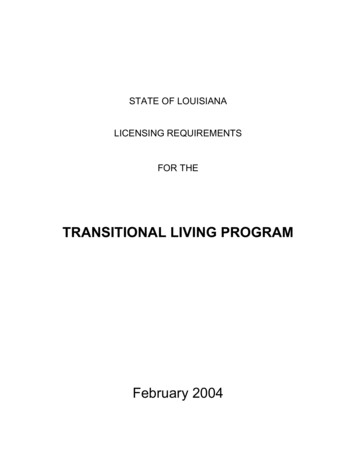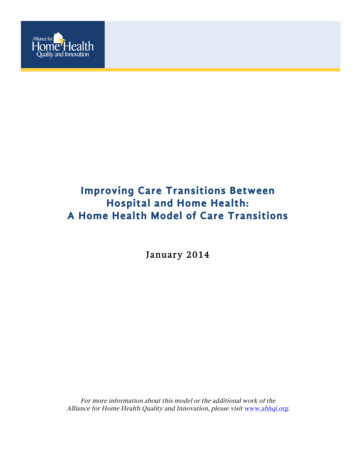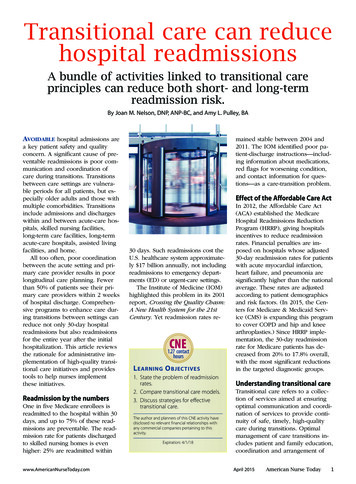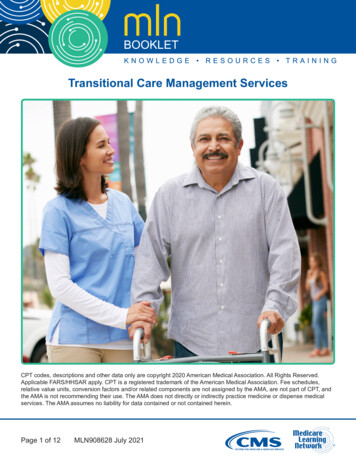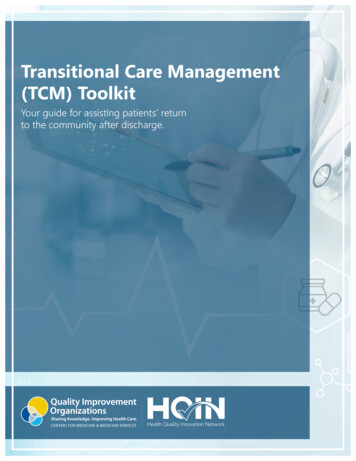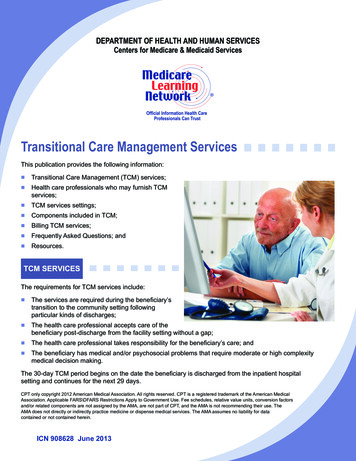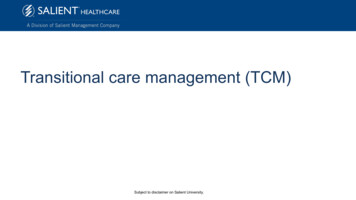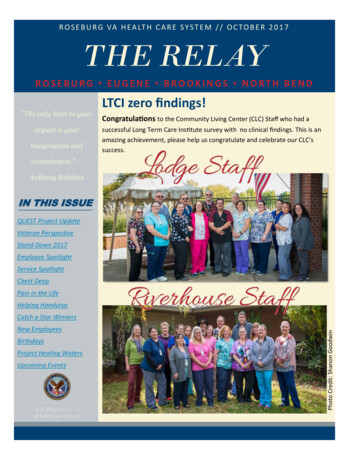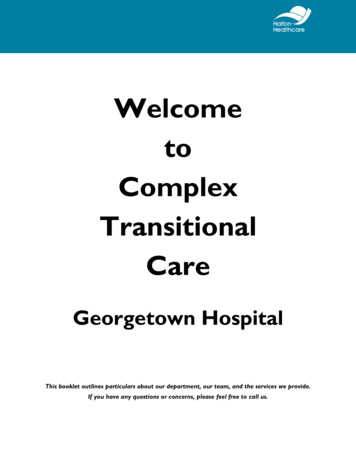
Transcription
WelcometoComplexTransitionalCareGeorgetown HospitalThis booklet outlines particulars about our department, our team, and the services we provide.If you have any questions or concerns, please feel free to call us.
Complex Transitional CareImportant Information:Hospital Main Phone #: (905) 873-0111Unit Phone Extension #: CTC 8190Patient’s Room #: CTCPatient’s Phone Extension #:Clinical Resource Nurse:Patient Information
Complex Transitional CareWelcome toComplex Transitional Care – Georgetown HospitalWe realize this may be a stressful time for you and your family. Your safety and health is our number onepriority. We prepared this information to provide you with some basic information about your stay on ourunit.When a patient no longer requires the hospital's acute care services, they may be transferred to the ComplexTransitional Care (CTC) Department – GH/CTC.Care on CTC is provided by a team of health care professionals to persons who have medically complex,nursing, and therapeutic needs. The complexity of patient needs requires the intensity of staffing levels, typicalof a hospital environment.The goal of the program is to optimize patients’ quality of life, maximize their independence and improve theirfunction, to the extent possible.CTC provides care for patients requiring: Palliative CareoGoal of Palliative Care is symptom management and comfort care for those who are sufferingfrom a life-limiting illness Long Term Complex Medical Management (LCMM)oGoal of LCMM is maintenance. Medically and complex specialized services are offered over anextended period of time to maintain/slow the rate of functional losses Short Term Complex Medical Management (SCMM)oGoal of SCMM is stabilization and progression. Medically complex and specialized services toincrease activity tolerance and progress functioning overallThe initial weeks of your admission to GH/CTC are an assessment period. During these weeks, members ofour interprofessional team (i.e. PT, OT, etc.) will meet with you to assess your current level of function, setyou up with appropriate equipment, and to develop a therapy schedule to help you progress towards yourgoals.The Discharge Planner may meet with you and your partners in care during your stay to discuss your progressand discharge planning options.Patients and their partners in care will be asked to provide a Power of Attorney (POA) document, if available.Patients/partners in care will also be asked to assign one family member to be the main contact whocommunicates with the patient care unit. This person may be the Attorney for Personal Care designated inyour Power of Attorney document. Information about your health will not be released to anyone other thanthe designated family member, unless specifically requested by you.
Complex Transitional CarePhilosophy ofComplex Transitional CareOur philosophy of care promotes quality of life and patient independence in an environment that supports ourpatients and partners in care with dignity, compassion, and respect.Through an individualized plan of care, developed together with patients and their partners in care, we striveto assist patients in maintaining or increasing their level of functioning in a comfortable and supportiveenvironment.Patients are encouraged to participate in therapeutic group programming, as able.Our InterprofessionalTeam MembersThe Complex Transitional Care Unit is both patient and family focused. Our team members are sensitive toour patient's individual and special needs. Care is delivered by a team of healthcare professionals who providea collaborative approach to care. Dietitian/Food Services Discharge Planner Ethicist Local Health Integrated Network (LHIN) – Home and Community Care Nursing Staff Occupational Therapy (OT) Occupational Therapy Assistant / Physiotherapy Assistant (OTA/PTA) Physicians Physiotherapy (PT) Recreational Therapy Social Worker Speech Language Pathologist Spiritual Care Services Unit Clerk Volunteers
Complex Transitional CareDietitian/Food ServicesDietitian/Food Services provides nutritionally balanced and appetizing meals consistent with dietaryrestrictions. Food intake is monitored and supplements are implemented as necessary to maintain optimumnutritional requirements. The Registered Dietitian (RD) assesses patients at risk for poor nutrition andimplements care plans to prevent malnutrition. The RD works closely in collaboration with theinterdisciplinary team members to achieve common goals.Discharge PlannerThe Discharge Planner assists in planning appropriate home care services and/or community resources.EthicistWhile in hospital you may be faced with making difficult treatment decisions for yourself or a family member.The Ethicist’s role is to facilitate good decision-making processes and support individuals through thoseprocesses. The Ethicist may be able to help you: Identify the information you need to make a treatment decision Understand the ethical and legal implications of your treatment decision Explore the benefits and burdens of different treatment options Link you with other persons and resources within and outside the organizationLocal Health Integrated Network (LHIN) – Home and Community CareLHIN Community Care provides: Home Care Services Information about community services availableNursing StaffNurses help to develop a care plan, working together with physicians, therapists, the patient, the patient'spartners in care, and other team members, that focus on treating illness to improve quality of life. Care plansare established and implemented using a team approach. Expert and competent nursing care is provided at alltimes by our nursing team.The Clinical Resource Nurse (CRN) oversees the nursing team in providing nursing care to your loved oneand is able to respond to questions patients and/or partners in care may have regarding the unit or the careplan during the week.Occupational TherapyOccupational Therapy (OT) focuses on quality of life and independence in daily activities. Referred patientsare assessed in the areas of self-care, cognition, and the need for mobility or positioning devices. The OT staffassists nursing staff with skin care and work closely with the Social Worker/Discharge Planner and partners incare to co-ordinate equipment for discharge. The OT staff works closely with the physiotherapy staff topromote maximum independence in mobility. The OT staff also collaborates with the Recreational Therapistto promote participation in leisure and social activities.Occupational Therapy Assistant / Physiotherapy AssistantOccupational Therapy Assistant / Physiotherapy Assistants work under the direction of a Physiotherapistand/or Occupational Therapist in the provision of physiotherapy services and occupational therapy servicesPhysiciansPhysicians will not always visit daily. Visits may occur more often should the patient’s condition warrant or atstaff, patient, or family’s request.
Complex Transitional CarePhysiotherapyPhysiotherapy provides treatment to maintain and increase referred patients’ physical functioning, mobility, andquality of life. Each patient is assessed by the Physiotherapist (PT) for: Ability to transfer safely Ability to ambulate safely Physical strength Range of motion Balance Functional mobility Their need for a safe walking aidPhysiotherapy is provided by the Physiotherapist and the Physiotherapy Assistant. Group exercise classes,individual exercise programs, transfer and ambulation training help to improve movement, strength, andwalking ability.Modalities may also be used to help decrease pain and increase patient comfort as well as achieve personalphysiotherapy goals. The physiotherapy staff works closely with all other team members to ensure the patientachieves their maximum level of mobility and quality of life.Therapy may be provided by any member of our interdisciplinary team.Recreational TherapyThe Recreational Therapist utilizes recreation and leisure to enhance patient well-being and contribute toquality of life. Recreational therapy adopts a holistic approach, focusing on the spiritual, emotional, physical,cognitive, and creative needs of the patients. Programs are designed to reflect and meet these needs.Programs are offered in large and small groups and on an individual basis.Social WorkerThe Social Worker helps patients/partners in care to enhance their individual and collective well-being. SocialWorkers help patients and families adjust to illness, access community resources and plan for post-dischargeneeds and services. What differentiates social workers from other professionals is our focus on the socialcontext of clients’ lives and on the resources available to help resolve their problems.Speech Language PathologistThe Speech Language Pathologist (SLP) assesses and provides therapy for speech/language and swallowingdisorders. Components assessed: Swallowing: How people eat and drink Auditory comprehension: What they understand Verbal expression: What they say and how they say itStaff have 24/7 access to a Language Line for interpreter services for those who do not speak English.Spiritual Care ServicesSpiritual Service is available to patients/partners in care to help with individual spiritual needs.Patients who wish to be supported by their own faith community are encouraged to contact theirchurch/temple/mosque for direct care. The hospital Spiritual Care Practitioner/Chaplain is also available tooffer emotional, socio-psychological and spiritual supports to patients and families.Weekly non-denominational Christian worship is offered on GH/CTC. Please see Recreational Therapyweekly schedule posted in your room.
Complex Transitional CareUnit ClerkThe Unit Clerk assists clerical functions including, answering telephone; completing requisitions; transcribingdoctors' orders; scheduling appointments; ordering and maintaining inventory of supplies; filing; data entry oncomputer system; staff scheduling.VolunteersOur volunteers are an integral part of the functioning of our Complex Transitional Care Unit, providing the"extra human touch", personal attention, conversation and social stimulus. They assist the staff by helping atmealtime and during music therapy, exercise and craft classes.Please do not hesitate to call any of our team members at any time. We also welcome your feedback andsuggestions. We endeavour to make your stay on the Complex Transitional Care Unit as pleasant as possible.
Complex Transitional CareDuring Your StayWhat You Will NeedPersonal ItemsYou are encouraged to bring your own sleepwear, underwear, bathrobe and slippers, your eyeglasses, contactlenses or a hearing aid, and personal care items such as shampoo, soap, toothbrush, toothpaste andmouthwash. A limited selection of personal care items can be purchased at our hospitalsClothingPatients are encouraged to wear loose, comfortable-fitting clothing (i.e. nighties open up the back) and safefootwear. Please label all clothing to prevent loss. Responsibility of laundering patients’ clothing will be left upto the patients’ familiesPLEASE NOTE: Patients are advised not to bring money or valuables into the hospital. The hospital doesnot assume responsibility for patient money or valuables. Patients choosing to bring them into the hospital doso at their own risk. It is recognized that patients will have personal items such as clothing, medications andpersonal support aids with them (e.g., eyeglasses, contact lenses, dentures, hearing aids, mobility aids such ascanes, walkers, prostheses or wheelchairs, etc.). However, the hospital will not assume responsibility for theseitems if they are damaged or go missing. Please mark all items with your name.What to Leave At HomeYour ValuablesPlease leave your valuables at home, including cell phones, iPads and laptops. The hospital is not responsiblefor them while you are here.Electrical Appliances, etc.Appliances which are not in good working order may present a fire hazard or an electrical hazard. Thefollowing personal devices are not permitted in the hospital: Heating devices of any type, such as heating pads or portable heaters Extension cords or power bars Fans TelevisionsAll allowable electrical equipment must be checked by our Biomedical Engineering Departmentto ensure that they are in good working orderHow Long Will Your Stay Be?Your length of stay will be determined on an individual basis when you arrive.The Discharge Planner/Social Worker may meet with you and your partners in care during your stay todiscuss your progress and discharge planning options.
Complex Transitional CarePatient and Family InformationVisiting HoursHalton Healthcare recognizes that family members and partners in care play an important part in the patient’shealing process and are essential members of a healthcare team. They provide support, comfort and, oftenessential information.Family members and partners in care should be identified by the patient and are welcome based on thepatient’s preferences, wishes and their safety.Quiet time has been designated daily, from the hours of 10 p.m. until 7 a.m., to promote a restful environmentfor our patients. Other than this, we endeavour to collaborate with the patient, family/partners in care, and theinter-professional care team to determine family supports and number of visitors at the patient’s bedside.Careful consideration will also be given to safety and the physical limitations of the space.We will work with patients and family members to accommodate overnight stay requests where possible. Toensure restful healing environment for all patients, overnight stay accommodations for multiple patient roomswill also be made in consultation with patients sharing the space. For safety, family members and partners incare will collaborate with the patient’s assigned clinician (i.e. nurse) for overnight stays.Fragrance Free PolicyIn consideration of the allergies and sensitivities from which people may suffer, and in recognition of the factthat there is evidence to support that scented products may have a detrimental effect on health, the wearing ofscented products (i.e. perfume, cologne, after-shave, lotions, hair products etc.) within hospital buildings is tobe limited such that the use does not offend any other individual or cause any sort of negative physical reactionor discomfort.Patients and visitors will be requested to comply with this policy.Smoke Free PolicyHalton Healthcare is a smoke-free organization. This means that smoking is not permitted anywhere on HaltonHealthcare property. This ensures that those who receive care, visit, work or volunteer are not exposed tothe health risks associated with second-hand smoke and/or triggers that may compromise their ability toremain smoke-free.PrivacyPhotography, videography and/or other electronic recordings (ie. Smart phones, iPads) are strictly prohibitedon all Halton Healthcare properties.Accessing Hospital/Health RecordsFormal Process under Personal Health Information Protection Act (PHIPA):To request access to your personal health information (health records) please contact the Clinical InformationServices Department at 905-873-0111 Ext. 8506.Your written direction/consent with signature is required outlining the records you wish to obtain i.e. specificvisit/admission dates. If you are requesting records for another person, you will have to provide proof that youhave the authority to act for that personHandwashingIt is important to wash your hands well and often while you are in the hospital. Washing your hands willreduce the chances that you will become sick or get an infection.
Complex Transitional CareMutual respectAt Halton Healthcare we strive to live our values of Compassion, Accountability and Respect in all we do.This helps create a safe and secure environment for everyone.Verbal or physical abuse of patients, staff, physicians, visitors or volunteers will not be accepted.If you witness inappropriate behaviour, please immediately report it to hospital staff.Family ParticipationSometimes families/friends like to bring in specific foods for their loved one. We welcome this but ask thatyou first check with the nurses to make certain your family member/friend is allowed to have these items onthat day. Food types and even food itself is often restricted for tests or procedures. It is also important thatafter feeding your family member/friend you inform the staff as to the amount and type of food eaten.Patient ActivityIt is not always possible to have all patients out of bed each day. Many circumstances must be taken intoconsideration. (e.g. patient condition and/or overall unit acuity).Pet Visitation (personal pet)Please speak to the Clinical Resource Nurse to arrange pet visitation for your loved one. You will be asked tocomplete a Personal Pet Visitation Checklist.NourishmentsThere are food vendors located on the Main Floor of the hospital in the Food Court. Hours of operation areusually Monday to Friday from 6 a.m. to 8 p.m.Recreation Therapy ProgrammingA schedule of programs is posted. You will be encouraged to attend programming as part of your therapy andto improve quality of life.External Regulated TherapyPlease speak to the Clinical Resource Nurse or a member of the therapy team to arrange an externalRegulated Healthcare Provider. The external provider will be asked to complete forms prior to providingservice.
Complex Transitional CareTherapeutic SpacesDining RoomThe dining/activity room provides a bright, friendly environment where patients are encouraged to dinetogether and socialize or participate in group activities. Family members and friends are welcome to participatein unit activities.Outdoor PatioThe outdoor patio on the GH/CTC unit is accessible during the summer months.Hats, sunscreen, and protective clothing are recommended in the warmer months.Services Offered to Our PatientsMobility AidsThe hospital will provide temporary mobility aids (i.e. wheelchairs, walkers, recliner chairs). The need forpermanent equipment will be assessed by the Occupational Therapist who will assist you with these purchasedecisions. Families are responsible for the cost of these items. Financial assistance may be possible throughthe Assistance Devices Program (ADP).Food Service DeliveryMeal trays are delivered to the patients on GH/CTC at set meal times.Patients/partners in care will be able to select meal preferences for the patient in accordance with the type ofdiet prescribed. Please see ‘nourishment’ section under the ‘Patient and Family Information’ for nourishmentoptions for our partners in care.
Complex Transitional CarePatient Safety
Complex Transitional CarePreparing for Your DischargePlanning starts the day you come to the hospital and includes steps such as assessing your needs, setting goalsand making plans. We will work with you and your family to start planning early for your safe and successfuldischarge. We will work with you and your family to start planning early for your safe and successfuldischarge.At the end of your stay, we will arrange, if needed: Referrals to the LHIN Home and Community Care Referrals to outpatient appointments A prescription for any medications you require A list of follow-up appointments (if applicable) or referrals to other doctors or therapists you may need tosee after you leave A discharge package that will include Information about recommended equipment, supplies and exercisesto do at home (if applicable)Discharge time is 10:00 a.m.Patients are responsible for arranging and paying for their own transportation when they are discharged fromthe hospital.Please ensure arrangements are made well in advance to avoid delays in your discharge time.If you have any questions about your discharge or your care needs before you leave the hospital, please do nothesitate to ask a member of our team. We are here to help you.For a smooth transition, please: Identify a family member/friend ahead of time who can help transport you home. If personaltransportation is not available, we can provide you with a list of local transportation options such as taxi,wheelchair taxi or private transportation services for patients requiring a stretcher Arrange for pick-up at 10:00am. If there is a delay, you may need to wait in a designated area Notify the nurse of your plans at least 24 hours before discharge Review your discharge instructions and talk to your nurse if you have any questions or concerns
Complex Transitional CarePatient RelationsWe are committed to delivering exemplary patient experiences, always.We recognize that sometimes patients and their families may have concerns or wish to share their positivepatient experience with us. To make continuous improvements we want and need to hear from you.When should I contact a Patient Relations Advisor?We encourage you to always speak to your nurse or Clinical Resource Nurse. If you are not satisfied with theresponse (or if they are not available), ask to speak to the Patient Care Manager. If you have concerns that arenot resolved to your satisfaction, please contact our Patient Relations Advisor at 905-845-2571 Ext. 4138.Georgetown Hospital FoundationHealing through gratitudeMaybe it was the smile or a kind word that brought your loved one comfort. Perhaps it was a procedure ortreatment available at your hospital, close to home, that made your experience at GH exemplary.Every day, patients and their families ask how they can share their appreciation in a meaningful way for thecare they receive at MDH. There are many ways: give thanks share your story volunteer contributefinancially.Your contribution – in any form – celebrates your caregivers and puts essential equipment in their hands toensure patients receive great care that is not possible through government funding.If you are interested in hearing about what your gratitude can accomplish, please contact a member of ourteam in the Georgetown Hospital Foundation at 905-873-4599.You may also be interested in more information from our website: www.georgetown hospitalfoundation.ca
Complex Transitional Care1 Princess Anne DriveGeorgetown, OntarioL7G 2B8Canadawww.haltonhealthcare.com
Halton Healthcare recognizes that family members and partners in care play an important part in the patient's healing process and are essential members of a healthcare team. They provide support, comfort and, often essential information. Family members and partners in care should be identified by the patient and are welcome based on the

